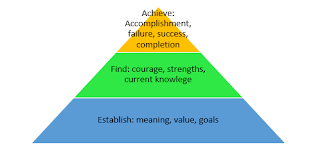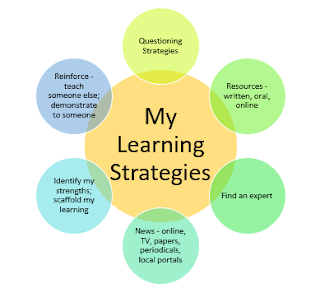TESL 0130: Unit 4 - Learner Autonomy and Final Thoughts
The final week is here. In fact, it is almost complete.
Discussion this week has focused on a couple of ideas - for me the most prevalent of which have been learner autonomy and adding specific strategies to a lesson plan around reading and vocabulary development.
Self Directed Learning Strategies - I developed two small diagrams that explain how I see this working. The first diagram explains why self directed or autonomous learning could happen. The second is a non-linear, non sequential diagram to show different strategies that could be used to support this type of learning - also sometimes identified as autonomous learning.
To make this more real and to think through the process more, I created a video to share how I see these steps taking place in a real life learning scenario. I shared an example of a self directed learning plan that I did for a class a number of years ago and described how I went through the process of using the strategies identified above. You may choose to watch that video at this link: Learning to Drive the Tractor
Of course, this module in TESL is about reading and vocabulary and so we were also to work through the process of adapting an existing lesson plan we had previously created to support specific development around reading and vocabulary. I have tried to do that, but as I have worked through the process of that, I do struggle with how much can we reasonably expect to teach in one lesson? When I look at some of the content that our workplace learners go through in a three hour class, my feeling is that the lessons are less complex and demanding than the lesson that I have been working on. I believe that the lesson I have been working on has merit, and seems to follow what I have been learning thus far - both in the Fundamentals course, and with the adaptations for this course, but I am concerned that it is too much for one lesson. I have observed that in many EAL classes, things are fluid and there is much adaptation to what is the identified need that may come up "in the moment".
In trying to think how to adapt an in depth lesson plan to a class context, perhaps the best way to be prepared is to consider that if it does not get completed in one class, it can be completed the next class. I suppose that judgement call depends partly on the expected outcomes of the class as a whole, and if there is a specific amount of content that must be covered to satisfy the program requirements, funders, etc. Regardless, I am looking as the lesson as a guideline for how things could go and not necessarily how they will go. Keeping that in mind, here is the lesson plan I have been developing.
Lesson Plan - Hiring A Babysitter - Reading & Vocabulary Focus
It seemed important to me to not leave the course without a final blog post, even if only for myself to tie up the loose ends in my mind and circle me back to why I choose to be engaged in this learning. I know that my preference is "knowing" rather than "learning", and that the learning process is often frustrating for me, but I come back to it because it is important. Certainly I have grown and changed in four weeks and I think I know more now than I did then. In working with newcomer staff again this week I am reminded that I cannot see all the changes they face, but if I can help in this way - for me to learn to how to better support them, then I have accomplished something. And, that is enough to keep going.
Discussion this week has focused on a couple of ideas - for me the most prevalent of which have been learner autonomy and adding specific strategies to a lesson plan around reading and vocabulary development.
Self Directed Learning Strategies - I developed two small diagrams that explain how I see this working. The first diagram explains why self directed or autonomous learning could happen. The second is a non-linear, non sequential diagram to show different strategies that could be used to support this type of learning - also sometimes identified as autonomous learning.
To make this more real and to think through the process more, I created a video to share how I see these steps taking place in a real life learning scenario. I shared an example of a self directed learning plan that I did for a class a number of years ago and described how I went through the process of using the strategies identified above. You may choose to watch that video at this link: Learning to Drive the Tractor
Of course, this module in TESL is about reading and vocabulary and so we were also to work through the process of adapting an existing lesson plan we had previously created to support specific development around reading and vocabulary. I have tried to do that, but as I have worked through the process of that, I do struggle with how much can we reasonably expect to teach in one lesson? When I look at some of the content that our workplace learners go through in a three hour class, my feeling is that the lessons are less complex and demanding than the lesson that I have been working on. I believe that the lesson I have been working on has merit, and seems to follow what I have been learning thus far - both in the Fundamentals course, and with the adaptations for this course, but I am concerned that it is too much for one lesson. I have observed that in many EAL classes, things are fluid and there is much adaptation to what is the identified need that may come up "in the moment".
In trying to think how to adapt an in depth lesson plan to a class context, perhaps the best way to be prepared is to consider that if it does not get completed in one class, it can be completed the next class. I suppose that judgement call depends partly on the expected outcomes of the class as a whole, and if there is a specific amount of content that must be covered to satisfy the program requirements, funders, etc. Regardless, I am looking as the lesson as a guideline for how things could go and not necessarily how they will go. Keeping that in mind, here is the lesson plan I have been developing.
Lesson Plan - Hiring A Babysitter - Reading & Vocabulary Focus
It seemed important to me to not leave the course without a final blog post, even if only for myself to tie up the loose ends in my mind and circle me back to why I choose to be engaged in this learning. I know that my preference is "knowing" rather than "learning", and that the learning process is often frustrating for me, but I come back to it because it is important. Certainly I have grown and changed in four weeks and I think I know more now than I did then. In working with newcomer staff again this week I am reminded that I cannot see all the changes they face, but if I can help in this way - for me to learn to how to better support them, then I have accomplished something. And, that is enough to keep going.


Comments
Post a Comment